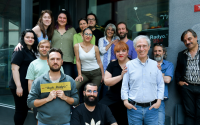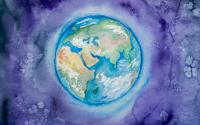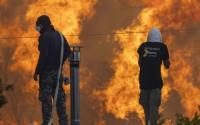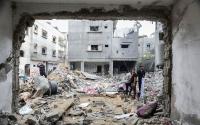And that includes the right to criticise the way the war is going
Guardian, Saturday October 13, 2001
While clearly sincere in their hatred of the Taliban, Tony Blair and George Bush may be grateful for one of the house rules of Afghanistan. The Taliban's objection to both photography and foreigners has made this the most invisible war of modern times. Where Saddam Hussein would invite CNN crews to film the alleged remnants of baby-milk factories, the first week of the new Afghan wars has proceeded through an almost pre-televisual exchange of counter-claims.
The missing pictures have increased the importance of words. Downing Street has attacked the BBC for broadcasting details of Tony Blair's future travel. The front page of the Sun urged the sacking of the reporter Kate Adie, although she merely answered a leading question from a presenter. The White House press secretary has advised reporters to "watch what they say", apparently referring not to strategic detail but to discussion of President Bush's performance as well. The question for the media in the first week of the conflict has been: in a war in which nothing is seen, should nothing also be said?
On the question of releasing details of Blair's flyabouts and of military action, all but the most fundamentalist libertarians in journalism accept that there are necessary differences between, say, election coverage and war reporting. Not since Margaret Thatcher in the mid-80s has a British prime minister been in such clear and present danger of assassination. So Blair's would-be silent flights should not be treated as some pretension of office.
And - given that Osama bin Laden will not be briefing the press before or after any future atrocities - there's little case, as there arguably was in the Falklands, for applying the same rules of scrutiny to the information from both sides. The word "claims", which patriots find objectionably pejorative, should be used for British and American statements of achievement, but it is not censorship for the military to seek to protect the lives of soldiers involved in battle. Not all D-notices are inherently evil. Some discretion is even more called for this time because this is the first war fought with the internet and digital phone networks fully operational. Information can pass across enemy lines in seconds.
Far more worrying than a fact-drought for defence correspondents is the sense - strong in America, nascent here - that an atmosphere of tension is being used as an excuse to limit criticism of leaders. In the US at least three newspaper columnists and one television talkshow host have so far been removed or suspended from their positions because of comments considered insufficiently reverential towards the president or his war aims. These sackings in the name of patriotism are a horrible blot on American democracy.
In Britain, the imposition of a single song sheet has been less official, although some Daily Telegraph commentators have implied that it is treachery to disagree with them. And there's a strong suspicion that Downing Street targeted the BBC and Kate Adie in order to distract attention from a row involving Stephen Byers's spin doctor. If that manoeuvre was used, it would be doubly hypocritical, as the original scandal involved the aide's suggestion that the international crisis could be used to bury other news. There is also, perhaps encouraged by Blairite spinners as well, a growing fear in some newspaper and broadcasting organisations of mentioning Islam at all. A proper concern about encouraging racial hostility should not lead to intellectual dishonesty.
Clearly nothing should be said which might direct violence against a Muslim in any British or American city. Yet those who carried out the September 11 bombings seem to have been adherents of Islam, though of an extremist kind. The suicide bomber would not exist without the promise, in which it's alleged some Muslims believe, of a paradisal orgy in the afterlife. So the role of some Islamic beliefs and teaching in creating psychopathic martyrs is as suitable a subject for reporting as the role of some Irish Catholic priests in tolerating or encouraging IRA killing.
Tony Blair is married to a Catholic but would not walk around glibly saying "Catholicism is a religion of tolerance and peace." It can or can not be, depending on who teaches and who hears. So it is with Islam and it is bizarre to pretend, as Tony Blair and the Sun seem determined to, that religion is irrelevant to the fate of those planes a month ago. (Indeed, it's an oddity of the present tensions that the Sun has been more politically correct on the question of Islam than the Guardian. Strange times.)
I am not simply defending liberal dissent. One of the sacked columnists had called for Muslim countries to be invaded and converted to Christianity. That's pretty sick stuff from the perspective of many but a good working definition of democracy is having to listen to stuff that makes you vomit.
Much of what Bush and Blair are currently doing invokes a purity of position: we are elected, we are democratic, while "they" are neither. During this conflict, nothing should be printed or spoken which might endanger the lives of our leaders or their soldiers. But, if you claim to be fighting for freedom, you must also accept one of its consequences: criticism, debate and scepticism towards your account of how the war is going. Careless talk costs lives, but careless censorship costs democracy.






